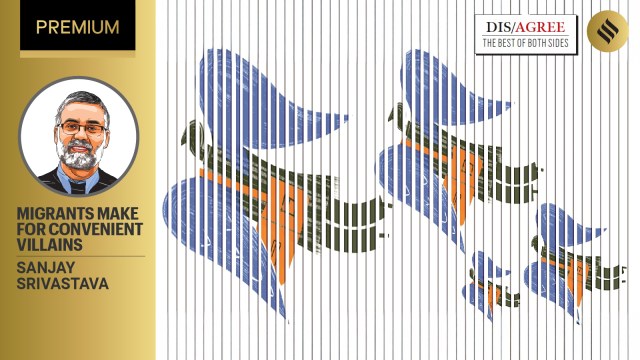
It has been exactly 50 years since the publication of John Berger and Jean Mohr’s A Seventh Man. The book poignantly documents the lives of migrant workers in a Europe that needed their labour but rejected their presence. In the Preface to the 2010 edition, Berger wrote, “It can happen that a book, unlike its authors, grows younger as the years pass.” A Seventh Man has grown younger because, though its facts and figures may now be outdated, the mirror it held up to the privileged about their treatment of beleaguered migrant workers is as clear as ever. The book’s subject, as Berger also noted, “is European, its meaning global”. Now, around the globe, migrants, refugees and asylum-seekers have become scapegoats for all that is wrong with the present and thought experiments for a future that, ironically, is based on the past.
According to UN data, around 4 per cent of the world’s population currently lives in a country other than where it was born, whether legally or (according to the laws of host countries) illegally. That is, just over 300 million people are living outside their countries of birth. Not all migrants are equal and those at the top of the mobility pecking order — white collar professionals and “golden visa” holders, for example — enjoy legal and cultural rights similar to citizens of host countries. What is clear is that migrants at the bottom of the heap — those Berger identified as seeking an “opportunity to earn a living, to have enough money to act” upon the barest necessities of a decent life — have become sites of significant moral dramas of our times. And though they are actors in such dramas, they are also bit players in what are morality plays that seek to define our times.
The first of these is the demand for a strong state that will secure the borders against “too much” or any immigration. This is extraordinary as those who demand a strong state simultaneously rail against state control and regulations, arguing that market forces should be allowed to take over state activities. In the United Kingdom, politicians and activists such as Nigel Farage and Tommy Robinson propagate the narrative that a “weak” state has allowed national borders to be breached by undesirable populations. And in the US, Trump’s MAGA movement has thrived on similar sentiments. It is important to recognise the key moral argument here: That just as a family can only flourish if there is a strong father figure, the national family too needs a patriarch, the strong state.
The second aspect concerns the ways in which the migrant is a vessel for ideas about culture and the past. There is gathering support for the idea that culture is like a commodity and that if you cover it in stain-resistant wrapping, it will stay pristine and, more importantly, just as it was 100 years ago. Here, migrants and asylum-seekers become threats to culture-as-commodity: They grab it with their grubby hands, exhale their strange smells upon it and paint it in their own colours. Ignoring the fact that the only unvarying truth about cultures is that they are forever changing is a crucial aspect of this morality play. It is also ironic that those who hold this view have no problems with the idea of trans-border global financial and economic flows. And yet, such flows also carry within them the forces that are constantly transforming cultures. However, morality tales need clearly identifiable villains: In India, these might be Rohingya refugees and in France, those of Arabic origin.
The culture-as-commodity perspective is strongly linked to another important idea. This the morality tale of a Golden Age, the idea of a past we must return to in order to solve the problems of the present. In this Golden Age, culture was homogenous and harmonious and the presence of “outsiders” has deeply disturbed the equilibrium. The Golden Age narrative is one of the key ways in which arguments about migrants and asylum seekers are currently expressed.
Finally, it is in the nature of morality tales to present a black-and-white view of the world such that those who are their readers are able to distance themselves from the conditions of “evil” that are being described. It is crucial that the audience for such stories does not itself become implicated in the problem that is identified. The audience is always positioned as needing clear-cut solutions whilst having nothing to do with its cause. So, it is rarely asked: Who created the conditions for the making of refugees and asylum-seekers? What, for example, has been the role of the French in its former sub-Saharan colonies, and the Euro-American policies of self-interest that have supported murderous regimes in different parts of the world and created the conditions that make for refugees? And, what of the making of Palestinian refugees and asylum-seekers?
But morality tales require that the propagation of violence in faraway places, that may have material and financial benefits but also create conditions for the making of immigrants, refugees and asylum-seekers, must be hidden from view. It requires that those who create such conditions can view themselves as under threat from those whose miseries their governments have created.
In our time, the migrant, the refugee and the asylum-seeker are not just workers necessary to do the jobs others might refuse. They have been woven into the moral fabric of receiving countries as the evil that is required to prove the goodness of the hosts.
The writer is Distinguished Research Professor, Department of Anthropology and Sociology, SOAS University of London